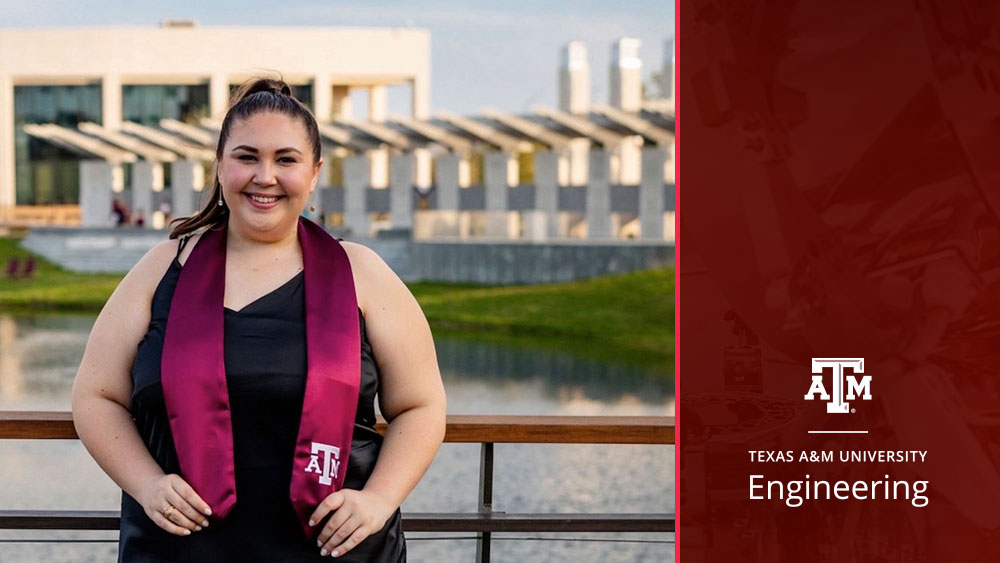
Abbey Weyand began programming when she was only twelve years old. She eventually decided to pursue cybersecurity partly out of her interest in the profession but also because she believed it was the best way to help others.
Ten years later, that goal is in sight as she prepares to graduate this May.
Weyand is a senior interdisciplinary engineering major at Texas A&M University. She is also minoring in cybersecurity through the Department of Multidisciplinary Engineering and computer science through the Department of Computer Science and Engineering.
“I find great joy in helping others, and cyber work has provided me with that opportunity,” she said.
Weyand spent her high school years taking various computer science classes, from robotics to software development and cybersecurity, even participating in online cyber competitions for female students.
While going through the Entry to a Major process as a student at Texas A&M, Weyand was unaware that interdisciplinary engineering was an option and originally entered a different major. After a few semesters, she knew it wasn’t the right fit for her and contemplated switching out of engineering altogether.
However, a conversation with Doug Beck, the multidisciplinary undergraduate advisor, changed the course of her undergraduate studies completely. Beck suggested Weyand give interdisciplinary engineering a try and work with him to build a degree plan better tailored to cybersecurity. Despite the appeal of a custom-designed degree, Weyand was hesitant to change her major, a common story she’d heard about college students.
“I felt like I was like failing myself and my family, in a sense. But they just reassured me, ‘We know you want to do cyber. If that's your end goal, do what you need to do,’ so I hopped over to interdisciplinary engineering, and the rest is history.”
As interdisciplinary engineering student equipped with an extensive plan, Weyand had the unique opportunity to take courses in cybersecurity, forensic and investigative science, and law and policy, as well as engineering courses in computer science, industrial systems and electronic systems.
For a rapidly evolving industry like cybersecurity, taking in new types of knowledge is an absolute must. “I’ve been able to incorporate different types of engineering and non-engineering courses that truly created a degree specific to me,” Weyand shared. “One of the best benefits of interdisciplinary engineering has been the ability to adapt my coursework to the field’s ever-changing needs.”
One of her courses this semester included a directed studies program with Paula deWitte, a professor of practice in the computer science and engineering department and the Zachry Department of Civil and Environmental Engineering. Weyand describes the “cloud” as a virtual way of holding data to keep files safe. Her study in the program involved learning about public versus private or hybrid clouds, finding vulnerabilities and learning how data is stored.
She also found her preferred niche within cybersecurity’s broad field — law and policy documentation. Companies must stay within the parameters of these essential policies to remain accountable to their stakeholders and to provide secure services.
“I like the governance side of cyber, especially because there are so many realms you can go into,” said Weyand. “‘Red team’ security professionals focus on simulating virtual attacks and reporting those results to businesses to improve their cyber defenses. ‘Blue team’ focuses on virtually defending and securing a company’s systems. There’s also cryptography, the decryption of hashes and codes. It’s very fun, and I love it. I've gotten to do like every side of it, so it feels good to settle on governance and risk.”
Weyand also joined the Texas A&M Defense Cyber-Leader Development Program, a collaboration between the U.S. Department of Defense (DOD) and Texas A&M that offers resources to help prepare students for military or civilian careers within DOD organizations.
Through the program, Weyand found an internship with MISI, a nonprofit organization in Maryland, where she learned about cyberattack mechanisms and defensive incident response The training included security camera hacking, drone hacking and simulated environments in which interns searched for malware that had infected a single computer and then spread through a shared file to all computers.
Weyand is also a cofounder of the InterDisciplinary Engineering Association (IDEA) student organization, which provides support, encouragement and mentorship to students entering the interdisciplinary engineering degree.
“Really, we’re there to be a guide for prospective students and new majors. I know I would have appreciated that kind of peer support system when I was trying to get into the major.”
Her studies and hard work paid off when Weyand accepted a cybersecurity consultant job offer last fall at Edgile, a cybersecurity and risk management cloud provider in Texas. “Texas A&M and my internship have taught me everything I know about cybersecurity. I'm very thankful because you can only self-teach yourself so much. The cyber professors here are phenomenal and some of the best professors I've ever had.”
For Weyand, seeing the fruition of her early goal is the most satisfying part of her academic journey. She hopes her story can give other students encouragement if they’re considering changing their majors, especially if they are studying on scholarships or are aware of finances every semester. “I'm here; I've done it,” she shared. “I’m graduating on time, and I have a job lined up. It’s possible for others too.”
“I’ve been solid in my career goals since a much younger age than most. From the beginning, all I’ve wanted to do was help people. It feels surreal and incredibly rewarding that I get to do so in just a few short months.”